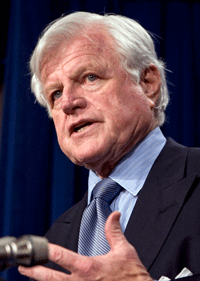Will federal health reform be like "the Massachusetts plan on steroids," as one commentator predicts, or something else entirely? Will it require individuals or employers to "play or pay"? Will it involve some new form of government-run health care or leave the current system more or less intact? And the biggest question of all: who will pay for it all?
As exact language for health care legislative proposals begins to dribble out from Congress, some answers begin to appear. The daunting challenge was the hottest topic at the Catholic Health Association's annual assembly this month in New Orleans. But in public talks and in private conversations, nearly everyone acknowledged that the devil is in the details of the various House and Senate plans still being written and amended. And inevitably, the final legislation will likely be an amalgam of the current proposals.
Although each of the bills deals with some aspect of health care reform that the sponsoring member of Congress considers most important, none of them fully addresses the gamut of issues raised by the health reform debate. Sen. Ted Kennedy of Massachusetts, a longtime advocate for health care reform, and his fellow Democrats on the Senate Committee on Health, Education, Labor and Pensions released a 316-page partial draft of a bill, titled the Affordable Health Choices Act, which would require individuals to purchase health insurance except in hardship cases. A similar requirement is a central component of the health plan currently in effect in Massachusetts, which was spearheaded by Sen. Kennedy and also requires employers to contribute to health insurance for their employees and individuals to purchase insurance if they are not covered by a plan through work.
Sen. Max Baucus, D-Mont., and the Senate Finance Committee he chairs released the language of their health reform proposal the week of June 15, with markup of the legislation the following week. The goal of having legislation reach a House-Senate conference committee by September and signed by President Barack Obama in October is "ambitious but doable," said Michael F. Rodgers, CHA senior vice president for advocacy and public policy.
Government-run?
A key sticking point in the road to national health care reform has been the question of whether there should be a government-run health plan that would compete with private insurance companies. Some advocates argue that the so-called "public option" is necessary to ensure universal coverage and will cut down on health care costs. Others say it could put private insurers out of business and eventually lead to government-sponsored health care becoming the only option for all but the wealthiest Americans.
Sen. Kent Conrad, D-N.D., has proposed a compromise that would create nonprofit health care cooperatives with federal seed money. The cooperatives would be owned by groups of residents and small businesses and would negotiate directly with medical providers. Although the White House has not proposed any specific legislative language, President Obama has taken a hands-on approach to the debate, with a town hall meeting in Green Bay, Wis., on June 11 and an address to the American Medical Association on June 15. "In 2009, health care reform is not a luxury. It is a necessity we cannot defer," the president said in a June 2 letter to Kennedy and Baucus.
The religious community is making its own contribution to the debate. An interfaith service of witness and prayer is set for June 24 in Washington, with similar events planned around the country as part of an interfaith week of prayer for health care reform. More than 40 national faith organizations and religious denominations were expected to participate in the Washington service.
"We must seize the opportunity for reform now -- we can't wait any longer," says Kathleen A. Curran, CHA senior director for public policy. "Don't let partisanship or ideology become roadblocks... We must have a system that makes health care available and accessible to all."








